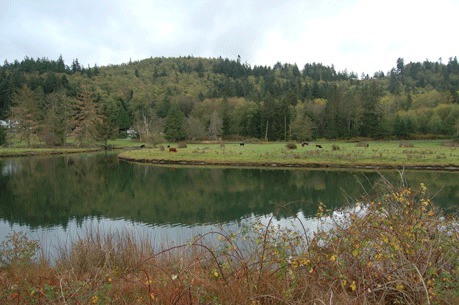The Whidbey Camano Land Trust announced today that it purchased 152 acres of property on North Whidbey near Dugualla Bay that will be permanently protected as habitat for shorebirds, waterfowl and baby salmon.
In four separate transactions, the Land Trust completed purchases of properties in the top-priority area of Washington State’s salmon recovery program. Valued at $2.3 million, the purchases include 29 acres with a historic lagoon and forested upland, 39 acres of low-lying wetland and field, and 45 acres of tidelands, all on Dugualla Bay, plus another 39 acres of diked land on nearby Dugualla Lake.
The newly acquired properties will be permanently protected and significant portions will be restored to more natural conditions. Over time, the Land Trust plans to convert the field next to Dugualla Lake into a freshwater wetland habitat to benefit shorebirds and waterfowl, including Western sandpiper, dunlin, and several duck species.
The Land Trust also has received state funding to explore the feasibility of restoring a tidal flow connection between Dugualla Bay and the recently purchased properties, including the lagoon. This would improve vital rearing habit for wild juvenile Chinook salmon, including threatened runs from the Skagit, Stillaguamish and Snohomish River systems.
The Dugualla Bay tidelands provide important rearing and feeding areas for migrating trout and char, and the adjacent uplands are important as habitat for a wide variety of birds.
The acquisitions were made possible by a number of competitive grants the Land Trust wrote and secured. They include grants from the Washington State Salmon Recovery Funding Board, Island County Conservation Futures Fund, Doris Duke Charitable Foundation’s Northwest Wildlife Initiative, and other sources, including private funds raised by the Land Trust.
Most of the properties were purchased from the Ducken Family LLC, which helped make the transaction possible with a generous donation of land value.
In one of the more challenging transactions, the Land Trust acquired a conservation easement from the Dugualla Heights Homeowners’ Association on 29 acres, including the historic lagoon. First the Land Trust signed an agreement with the Ducken Family LLC to purchase 28 acres, then assigned the agreement to the association. The association took ownership of the 28 acres and simultaneously sold a conservation easement back to the Land Trust on that property, along with one acre of adjoining bayfront land it already owned.
The conservation easement will protect the property and allow the Land Trust to pursue appropriate restoration activities.
“It was a fantastic fit,” said Peter Hunt, 2009 Dugualla Heights Homeowners’ Association president. “Our neighborhood has many stakeholders who represent different opinions, but overall, working with the Land Trust was an obvious win-win. We now have the ability to keep a natural, scenic setting in our neighborhood—something good for the environment and something we can enjoy.”
John Ducken, representing the Ducken Family LLC, said he liked working with the Land Trust.
“Whether we worked with the Land Trust or sold it (the property) to someone else, we would get the same value, so it is nicer that it can go to conservation,” he said. “We are glad that it worked this way.”
Ducken’s grandfather moved to Whidbey Island in 1911 and bought land near Dugualla Bay with money he made working in the Alaska goldfields. He also built the dike around the edge of Dugualla Bay so the lowlands behind the dike could be used for pasture.
The Land Trust eventually plans to allow low-impact public access to some of the properties after consulting with wildlife biologists and other experts to ensure such access will not adversely affect the conservation and wildlife values of the area. Opportunities for bird and wildlife viewing already exist at a roadside pull-off on Dike Road.
The acquisitions have the enthusiastic approval of Marilyn Dobbins, a Dugualla Heights resident.
“Once we built in this neighborhood, we naturally became very protective of all the elements that drew us here,” she said. “We weren’t sure how to go about saving this area. And then we became aware of the Land Trust and the Land Trust became involved. I don’t know how in the world it all came together — it was obviously a complicated negotiation and took a long time.”



